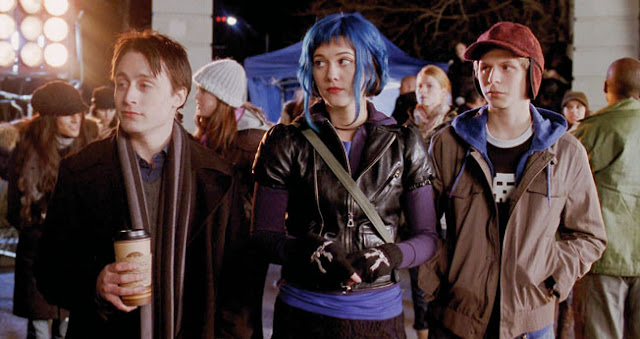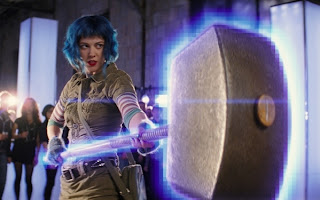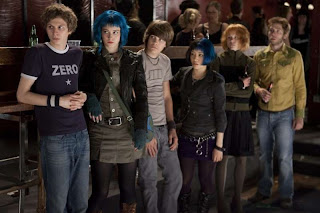Blech. This post is super late. Argh.
A couple years ago there was quite the furor over a certain
series of graphic novels (they were really in manga style than anything else,
but let’s not split hairs). Those comics were then turned into a movie starring
then-rising-star Michael Cera, and also starring a bunch of kind of random
people.
It had weird effects, story tropes borrowed from videogames, a
surrealist take on story and development, and cost a boatload of money.
That movie was Scott
Pilgrim Versus the World, and it tanked. Let’s talk about why.
Like a lot of nerds, I really loved this movie. Love this
movie. Sorry, it’s hard to think about Scott
Pilgrim in the present tense. But I really do love it. I even own the
official soundtrack, which is a crazy level of commitment for me. This doesn’t
mean, obviously, that I love it unreservedly. There are a lot of things I find
objectionable here, and let’s not even get into how I feel about Ramona’s
status as a prize to be won. It makes me angry.
Combining the best parts of comics, old school videogames,
and experimental filmmaking, Scott
Pilgrim really does feel like a loveletter to geek culture. The main
character, Scott, is an unrepentant man-child who plays in a terrible band,
loves videogames, and sponges off of his roommate. The girl, Ramona, is a total
manic pixie dream girl, who is daring because she used to live in New York,
likes obscure bands, and has really epic hair. Everyone talks in pithy
witticisms, the laws of physics don’t apply, and people explode into little
clouds of coins when you beat them.
If you don’t already know, the plot is pretty simple, but
very odd. Scott Pilgrim is a womanizing loser who falls for the unattainably awesome
Ramona. She’s cool with dating him (for some reason), but before they can get
together, he has to defeat her seven evil ex-boyfriends. So he does. And it’s a
funny heartwarming story where a guy finds something to believe strongly in,
even if it’s just the power of love.
Awww.
Now, aside from this being a really weird plot for a movie
to actually have, I think we need to look at why it didn’t work going into the
mainstream. Because, strange as the film sounds, it is really fun and a cute
little story. There’s a great throughline about how Ramona isn’t comfortable
with her past, and the idea that Scott’s done some pretty terrible things
himself aren’t bad either. There’s even a passing explanation that Scott could
be on his way to being just another evil ex of hers, and the idea that he’s
piled up a few evil exes of his own.
That, plus the general metaphor of the film, which is that
you can’t let someone’s past get in between you and having a relationship with
them. The past is the past and you move forward together. I like all of that.
Plus, Ramona’s pretty freaking cool, even if she is marginalized towards the
end. And Young Neil is awesome.
All of the themes I mentioned are pretty standard story
themes. Sure, they’re not the obvious choices, but they aren’t exactly off the
wall. So what was so hard to relate to about this film?
To start it off, they failed with the advertising. The first
movie poster they released was a shot of Michael Cera with a guitar and some
funky lettering. It was bad. At the time I didn’t know that this was based on a
comic, and I was so sick of Michael Cera being in everything and always playing
the exact same character, that I was about ready to puke. I was very unsold,
and I think a lot of other people were too.
And, really, that movie poster didn’t tell you anything
about the movie. Michael Cera, despite that weird couple of years where they
tried to push him at us, isn’t really the kind of star that opens movies with
just his name. We still want to know what the hell the movie’s about. When they
finally told us, well, it was still going to take some doing.
The plot is convoluted and weird. Yes, it’s based on a
graphic novel, and that makes it make more sense, but the actual plot – Scott
fights a bunch of random guys so that he can date this girl – doesn’t really
make sense when you hold it up to a little scrutiny. Why? Why does he have to
fight them? I mean, they do keep showing up and trying to hurt him and stuff,
but I don’t get… It’s just a little confusing it what I’m saying. And the
trailers and later posters didn’t really help with that.
But the final, and probably biggest, reason it didn’t catch
on with a large audience is that the style the film was created in is
inherently limiting. Or, to put it a meaner way, most people just didn’t get
it.
It feels a little mean to say that, but it’s true. Most
people just straight up did not get this movie. Was it trying to be a satire,
or an action movie or a – what the hell was it trying to be? And that’s a valid
question, when you come down to it. Scott
Pilgrim mashed so many genres, and invented a few of its own, that it makes
it really hard to figure out where this film goes.
People didn’t get it. And that’s fine.
No, really, it is. I don’t get French surrealist film. I
think it’s stupid and boring. But that doesn’t mean that no one can get French
surrealist film. I think it’s lovely that some people think it’s lovely. The
same thing goes here. I think this film was brilliant, an imaginative
masterpiece, that skillfully blended mediums and created a surrealist pastiche
that really captures the feeling of being in your twenties, afraid to grow up,
and even more afraid to commit to a real relationship and the responsibilities
that brings.
But I totally understand that some people can’t stand it. It
doesn’t speak their language, and that’s okay.
When it really boils down to it, I think this movie failed
because it forgot that not everyone would get it. In reality, it’s pretty
freaking rare that everyone gets any movie not made by Pixar. Most movies are
specialized to an audience, and that’s fine.
The problem comes when the studios
and the audiences don’t recognize that. The studios get mad that they aren’t
making enough money on their films, and the audiences get mad because they
can’t relate to a story, and they’ve been told that they must always be able to
relate.
What happens is that we all start aiming for the lowest
common denominator. We make things that are supposed to be accessible to
everyone, and things like that just aren’t very interesting. And they’re
definitely not good art. To make something really great, you have to admit that
it might fail. As long as we keep reaching for the middle, we’re screwed.
So. Studios: spend less money on your films and expect that
they will appeal to a very specific audience. Audience: don’t get butthurt if
you don’t understand the movie. Just go out and look for a movie that you do
understand. I think this will make us all much happier.
 |
| Wallace is one of the best parts of this movie. |






No comments:
Post a Comment